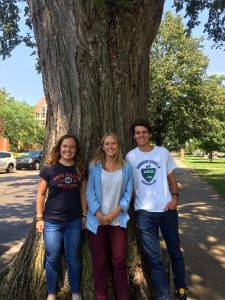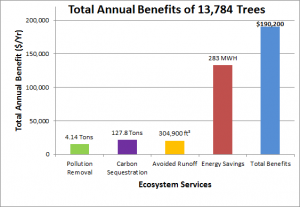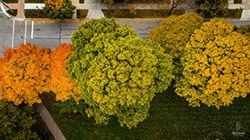By Zoe Gum, Alec Berrodin and Katelyn DeWitt, Hope College Biology Students

How much is that tree in your front yard worth? Sure, you might cash in once on its lumber value – or you could treat it as a long-term investment.
In the latter case, the value will grow tremendously as the tree ages and provides more ecosystem services, or benefits to its ecosystem. The mature tree will have a larger root system intercepting more water, more carbon-storing wood, and a larger canopy providing more shade and wind protection. Carbon sequestration, drought and flood mitigation, energy savings, and pollution removal are some of the other ways that trees provide important benefits to us.
In fact, trees on public property in Holland save the equivalent of $190,200 annually.
Our research project with the Hope College Biology Department began last year with the goal of understanding the benefits that the trees in Holland are providing. We have now done a census of most trees on Hope’s campus, Windmill Island, and public property for a total of 13,784 trees and 171 different species!
First, we measured the diameter at breast height (DBH) for each tree, which gives an estimate of tree size.

To determine ecosystem benefits, we used iTree software created by the USDA Forest Service. This program uses local weather and pollution data as well as tree DBH and species to determine the value of each tree’s benefits.
For example, a sugar maple with a DBH of 15 inches provides $32.11 in total benefits each year.
That maple reduces 33.5 cubic feet of stormwater runoff every year by intercepting precipitation with its canopy. It also absorbs and retains water through its vast root system. And this same maple also removes 14.07 ounces of pollutants every year when particulate matter sticks to leaf surfaces. Benefits like these continue to increase as each tree grows.
Both Hope College and the City of Holland have been intentional about this investment. Holland has been a Tree City USA for 39 years, and in 2019, Hope College was recognized as a Tree Campus USA for being sustainable, making an effort to plant new trees every year, and for replacing trees that are removed.
To involve the community in this effort, the data from this project have been used by a group of four students working with Professor Michael Jipping from the Hope College Computer Science Department to develop an app called TreeSap.
 This app collects the user’s location and pinpoints the nearest tree in our database. That tree’s unique ecosystem services data are then provided to the user. In the future, users will be able to add trees, contributing to our growing database.
This app collects the user’s location and pinpoints the nearest tree in our database. That tree’s unique ecosystem services data are then provided to the user. In the future, users will be able to add trees, contributing to our growing database.
One of our goals is to raise awareness for the essentially “free” ecosystem services provided by trees that people often take for granted. Ultimately, encouraging people to connect with nature is going to be the best way to develop the ethic that will allow us to solve environmental problems together.
Zoe Gum, Alec Berrodin, Katelyn DeWitt are biology students at Hope College. Zoe is a junior biology and philosophy double major from Traverse City. Alec is a senior biology major from Grand Rapids. And Katelyn is a junior biology major and geology minor from Holland.
![]() This Week’s Sustainability Framework Theme
This Week’s Sustainability Framework Theme
Community & Neighborhood: The places we live and the individuals we interact with support the development of our personalities and perspectives on life. Encouraging vital and effective communities is essential.
![]() ABOUT THIS SERIES
ABOUT THIS SERIES
Living Sustainably is a collection of community voices sharing updates about local sustainability initiatives. It is presented by the Holland-Hope College Sustainability Institute, a joint project of Hope College, the City of Holland and Holland Board of Public Works. Go to www.hope.edu/sustainability-institute for more information.

